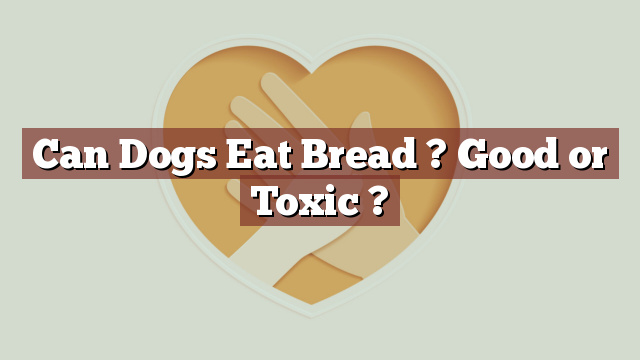Can Dogs Eat Bread? Good or Toxic?
Knowing which foods are safe for our furry friends is essential for their overall health and well-being. Many pet owners wonder if it is safe to share their favorite foods with their dogs. One such query that often arises is, can dogs eat bread?
Nutritional Value of Bread: Is it Beneficial for Dogs?
Bread is a staple food in many households, but when it comes to our canine companions, its nutritional value may not be as beneficial as it is for humans. Bread primarily consists of carbohydrates, which can provide energy. However, dogs have different dietary requirements than humans, and their bodies are not designed to digest grains as efficiently.
Can Dogs Eat Bread? Exploring the Safety and Toxicity.
Dogs can eat bread, but it is important to exercise caution. Plain, white bread is generally safe for dogs to consume in moderation. However, certain types of bread, such as those containing raisins or nuts, can be harmful to dogs. Raisins, in particular, can lead to kidney failure in dogs, making it crucial to keep any bread containing raisins away from your furry friend.
It is also important to note that bread may cause gastrointestinal upset in some dogs, leading to symptoms such as bloating, gas, or diarrhea. Therefore, it is recommended to introduce bread gradually into your dog’s diet and observe their reaction.
Potential Risks and Benefits of Feeding Bread to Dogs.
Feeding bread to dogs can have potential risks and benefits. On the positive side, bread can provide a small boost of energy and some essential nutrients. However, it is important to remember that bread is not a necessary component of a dog’s diet. Dogs require a balanced diet consisting of high-quality protein, fats, and properly portioned carbohydrates.
Excessive consumption of bread can lead to weight gain and obesity. The high carbohydrate content in bread can also cause a spike in blood sugar levels, which may be problematic for dogs with diabetes or those prone to developing the condition.
Dog Ate Bread? Here’s What to Do to Ensure Their Safety.
If your dog accidentally consumes bread, remain calm but vigilant. Monitor your dog for any signs of discomfort or adverse reactions. If you suspect that the bread contained raisins, contact your veterinarian immediately, as raisins can be toxic to dogs.
In general, it is always a good idea to consult your veterinarian about your dog’s specific dietary needs. They can provide guidance on suitable foods and portion sizes to ensure that your furry friend stays healthy and happy.
Conclusion: Bread in Moderation Can Be Enjoyed by Dogs.
In conclusion, dogs can indeed eat bread, but it should only be given in moderation and without any harmful ingredients such as raisins or nuts. While bread is not a necessary part of a dog’s diet, small quantities can be enjoyed as an occasional treat.
Remember, each dog is unique, and their dietary needs may vary. It is always best to consult with a veterinarian to determine the most appropriate and safe diet for your furry friend. By providing a balanced and nutritious diet, you can help ensure your dog’s long-term health and happiness.
Thank you for investing your time in exploring [page_title] on Can-Eat.org. Our goal is to provide readers like you with thorough and reliable information about various dietary topics. Each article, including [page_title], stems from diligent research and a passion for understanding the nuances of our food choices. We believe that knowledge is a vital step towards making informed and healthy decisions. However, while "[page_title]" sheds light on its specific topic, it's crucial to remember that everyone's body reacts differently to foods and dietary changes. What might be beneficial for one person could have different effects on another. Before you consider integrating suggestions or insights from "[page_title]" into your diet, it's always wise to consult with a nutritionist or healthcare professional. Their specialized knowledge ensures that you're making choices best suited to your individual health needs. As you navigate [page_title], be mindful of potential allergies, intolerances, or unique dietary requirements you may have. No singular article can capture the vast diversity of human health, and individualized guidance is invaluable. The content provided in [page_title] serves as a general guide. It is not, by any means, a substitute for personalized medical or nutritional advice. Your health should always be the top priority, and professional guidance is the best path forward. In your journey towards a balanced and nutritious lifestyle, we hope that [page_title] serves as a helpful stepping stone. Remember, informed decisions lead to healthier outcomes. Thank you for trusting Can-Eat.org. Continue exploring, learning, and prioritizing your health. Cheers to a well-informed and healthier future!

